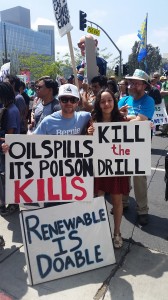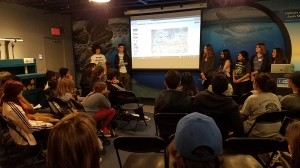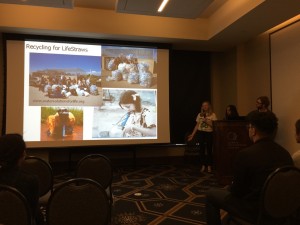Teachers – Why CalSTRS should divest from Fossil Fuels
What are the financial reasons for CalSTRS to divest from fossil fuels?
When it comes to fossil fuel divestment, which may come off as radical to some, you may be asking yourself, is it plausible for this money to be divested from such a large and powerful industry? The answer is yes! More than 1,000 institutions around the world have committed to divest, including universities, faith-based organizations, non-profits, municipalities, philanthropic organizations, and national and state pension funds, controlling $14.48 trillion in assets. It’s not a stretch to think that CalSTRS could be the next to do so. In California, cities like Berkley, San Luis Obispo, San Jose, Santa Monica, and San Francisco have already fully divested from fossil fuels. The City of San Francisco, for example, had the Board of Supervisors unanimously pass a nonbinding resolution urging the managers of the San Francisco Employees’ Retirement System to divest their funds in 2018; and the Board of Supervisors divested from five major oil companies. They have even approved a plan to work with CalSTRS. San Francisco’s goal is remarkably similar to ours and proves that it is not an overly ambitious endeavor. Not to mention that the University of California has also fully divested from all fossil fuels, making it the nation’s largest educational institution to do so. Keep in mind that these examples are only from California, but the extent of divestment efforts are much more widespread than that. So please, choose to be on the right side of the climate change fight and the right side of history. Teachers – let CalSTRS know that you want them to divest your money from fossil fuels.
Teachers contribute about 10 percent of their salary and other creditable compensation toward their pension. These funds, along with payroll contributions from employers and from the State of California, are invested by CalSTRS to provide the pension benefit upon retirement. CalSTRS lost over $1.63B in its Fossil Fuel holdings between July 2019 and June 2020. Furthermore, according to a Corporate Knights report done before the COVID-19 crash, CalSTRS would have made $5.5 billion more if they had divested ten years ago. They currently continue to lose money. CalSTRS should be divesting their money from fossil fuels and redirecting that money towards renewable energy. It has been proven that funds that exclude fossil fuels are increasingly outperforming those that still invest in fossil fuels.
In lieu of investing in nonrenewable energy sources, CalSTRS should invest in clean, renewable energy. Investment in clean energy is less likely to fluctuate and, in the long term, will yield better profits. According to Forbes Magazine, renewable energy stocks were “less volatile across the board than fossil fuels, with such portfolios holding up well during the turmoil caused by the pandemic, while oil and gas collapsed.” The website Renewable Energy World also stated that the fossil fuel industry management over the last decade has made the energy sector the worst-performing part of the S&P500. Even UC’s chief investment officers, Sherman and Jagdeep Singh Bachher said that they’re “betting” they can make money for the University of California without fossil fuel investment. All of this then means that in the future, if CalSTRS divests from fossil fuels, it definitely possible for them to keep incrementing their portfolio value without relying on fossil fuels, especially as Bachher notes that they pose an “unacceptable financial risk,” particularly with “geopolitical tensions and likely, a bumpy and slow global financial recovery in a post-pandemic world.”
What are the ethical reasons for CalSTRS to divest from fossil fuels?
Approximately 49% of the U.S. greenhouse gases come from fossil fuels, according to the United States Environmental Protection Agency – targeting fossil fuels would make the most impact overall. Fossil fuels are destroying our environment. They pollute at every step, from production to disposal of plastics and greenhouse gases into the atmosphere, contributing to climate change and global warming. Climate change is responsible for various natural disruptions and disasters, including our most current and impactful wildfires in our beloved California forests. As SoCal residents, we have witnessed first hand just how destructive these fires are and their worsening severity over time. Ultimately, fossil fuels are destroying the world around us. According to UN Secretary-General Antonio Guterres, the world is facing “a direct existential threat” and must rapidly shift from dependence on fossil fuels by 2020 to prevent “runaway climate change.”
Burning fewer fossil fuels is not only the primary solution to climate change, but it is also the most impactful way to tackle air pollution. According to an article by Yale University, in the U.S., air pollution takes the lives of about 100,000 people every year. It’s the cause of 3% of all U.S. deaths, which is more deaths than traffic accidents and homicides combined, and air pollution costs the American economy up to $1 trillion per year. The geographic distribution of health problems varies with the specific source of pollution. Industrial pollution such as oil refineries occurs in hotspots throughout Texas and the Southeast. The types of chemicals released through the fossil fuel extraction, refining, and release into the atmosphere also vary, but those involved include mercury, benzene, fine air particulate matter such as PM2.5, sulfur dioxide, carbon monoxide, and nitrogen oxides. Many of these are ranked in the top ten chemicals of major public health concern by the World Health Organization. Not to mention, according to a Harvard study, an increase of 1 μg/m3 in PM2.5 is associated with an 8% increase in the COVID-19 death rate.
As is the case for many environmental problems, those who deal with air pollution consequences are not the ones who cause the damage. In the U.S., high poverty areas endure disproportionally higher health and economic impacts of air pollution. Furthermore, according to this same article by Yale University, a recent study found that non-Hispanic whites breathe in around 17% less air pollution than they cause by their own consumption, while black and Hispanic people inhale more than 50% more pollution than is generated by their actions.
While some continue to debate the greenhouse effect, few can deny the importance of saving American lives – and lungs. Therefore, our teachers should keep Californian families safe by making sure their retirement pension in companies that promote the welfare of its people and future generations.
The petition for students is https://www.change.org/p/california-students-convince-calstrs-to-divest-from-fossil-fuels?source_location=topic_page
The petition for teachers is https://www.change.org/p/smmcta-have-calstrs-divest-from-fossil-fuels?recruiter=1143027451&recruited_by_id=d4fe8930-e33e-11ea-a81a-917f861995ed&utm_source=share_petition&utm_medium=copylink&utm_campaign=petition_dashboard
Team Marine Advocates for SB 54 and AB 1080
One of Team Marine’s biggest focus is combating plastic pollution. To take action in previous years, Team Marine has made many efforts in plastic pollution activism, advocacy, and community engagement. One of their projects consisted of constructing and displaying a giant plastic water bottle at Third Street Promenade to bring attention to the issue with the City of Santa Monica’s support. During their showcases, they also collected hundreds of signature from the community walking by to support SB 54 and AB 1080. Although SB 54 and AB 1080 were rejected in the 2019 legislative session, they have come back and have limited time to be revived in 2020. Some of the team’s members have come together to contact assemblymembers to vote YES on SB 54 and AB 1080. This revision is happening right now. Click here to see a part of their advocacy work.

Plastic Ocean Film Premiere
On January 17th, Team Marine attended the premiere of Plastic Ocean, a documentary about plastic pollution and its effects on human and environmental health. Before the screening we were able to talk to community members about the effects of plastic on the environment. We were also able to show our eco-costumes made up of things like plastic forks, straws, plastic water bottles and bottle caps. The movie itself highlighted the health and environmental concerns of plastic, especially on the ocean. After the movie we listened to the panel discussion which featured a wide range of environmentalists, one of which was actually Benjamin Kay, our club advisor. We would like to say thank you to the production team behind the movie, to everyone who attended and to those who spoke in the panel.
Sea the Change Youth Summit
By Sixtine Foucaut:
On Sunday, January 29th, we gave a slideshow presentation to local teen environmental clubs at the Sea the Change Youth Summit put on by Heal the Bay at the SM Pier Aquarium. We presented our methods of communication as a team, as well as examples of our past eco-art projects, through a powerpoint presentation filled with our past projects and tips for groups interested in pursuing similar eco-art projects. We’d like to thank Heal the Bay for organizing this event and allowing Team Marine to act as an inspiration to other schools and hear ideas from other environmental clubs! Thank you to the Santa Monica Pier Aquarium for hosting this event!
Break Free from Fossil Fuels March
By Amanda Samimi

On Saturday, May 14, thousands of Eco advocates convened at Los Angeles City Hall to march against fossil fuels. The “Break Free from Fossil Fuels” march consisted of speeches from both people affected by the hazardous consequences of oil drilling in their communities and ordinary advocates of climate action. There were also musical performances in both Spanish and English. There were hundreds of posters and signs cleverly supporting Los Angeles’s divestment from fossil fuels. Amanda and Mr. Kay held up signs that stated “Kill the Drill” and “Renewable is Doable”. At 3pm hundreds of renewable energy supporters walked the streets of downtown LA to send a message to elected officials such as Eric Garcetti and Jerry Brown that now is the time to break the chains of fossil fuel dependency.
Visit https://la.breakfree2016.org
UCLA Earth Now: Earth 2050 Presentation
On October 20th Team Marine captains Amanda and Zoe, and Mr. Kay presented to a total of around 120 students at UCLA for the Earth Now: Earth 2050 event put on by the UCLA Office of the Environment and Sustainability. We presented to three different high schools in the LA area about the state of our planet surrounding environmental issues such as climate change and what actions we undertook to mitigate climate change and pollution in our school and community. The presentation consisted of two components: the scope of the earth’s environmental problems and our community-based solutions. We mentioned some projects and activities such as our water audit, cigarette study, plastic bottle/cap art, and protests/marches just to name a few. We hope to see what the student attendees will do in their communities as they undergo environmental stewardship
Bernie Sanders Rally
By Amanda Samimi
On Monday, May 23, presidential candidate Bernie Sanders held a rally at our school, Santa Monica High School. Many Sanders supporters, including some Team Marine members, were overjoyed to have a presidential candidate speak at their very own school. Bernie talked enthusiastically for little over an hour about the platform of his candidacy, which includes policies such as providing universal healthcare, raising the federal minimum wage, and perhaps most importantly, combating climate change.
In previous debates and speeches, Sanders noted that climate change is the most important issue facing Americans today, and Team Marine could not agree more. On Monday, he dedicated a few minutes of his speech to addressing the grave issue of global climate change, which happened to be one of the segments in which he received the most applause. We would like to thank everyone who helped plan and set up such a successful rally and would like to remind everyone in California to vote in the Tuesday, June 7th primary.
Nothin’ But Sand
Another successful beach cleanup complete! On Saturday May 21, 2016 Team Marine and Marine Biology students attended Heal the Bay’s Nothin’ But Sand beach cleanup at Will Rodgers State Beach along with over 700 volunteers. All in all we ended the day by collecting around 110 lbs of trash off the beach, even though people were comme ting about the beach already looking trash free. Thank you to all the volunteers!!!
Side note: Heal the Bay just uploaded their 2016 beach report card for California, look up your beach to see if it is a ‘bummer’ beach or not here
Streets to Sea
By Amanda Samimi
On Thursday, April 28, 2016, Amanda and Christa represented Team Marine and Santa Monica High School at the annual Streets to the Sea Challenge put on by Generation Earth. Five middle schools and five high schools traveled to Disney Synergy Lab in Glendale to display their environmental projects. The students were asked to create and implement a water-wise solution to a problem present on their campuses. Team Marine submitted their water fountain audit to enter the competition. The day started off with breakfast, a presentation from one of the judges, followed by a walk-around display of students’ projects, lunch, another presentation, and lastly awards. Each school was asked to make a tri-fold display of their project. Team Marine repurposed an iMac box into a tri-fold poster board. We included pi charts of our data, photos of water fountains, and slides from our presentation to the sustainability coordinator of our district.
Every school received a glass trophy for making it to this stage of the competition, but only one middle school and one high school received the grand prize of a boat trip on the Floating Laboratory. Both Santa Monica High School and El Camino Real High School received the same score from the judges, but El Camino was the ultimate winner. Team Marine would like to congratulate El Camino Real High School for the success of their grand-prize winning project. We would also like to thank Generation Earth for putting on the competition and choosing us as finalists.













